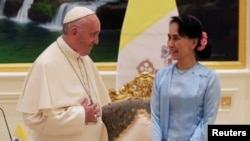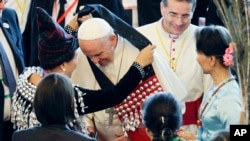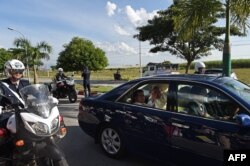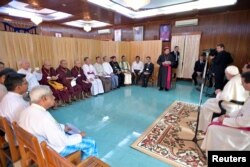Pope Francis has called for religious "unity" in Myanmar in a speech in the country’s capital that did not directly mention the plight of the Rohingya.
“Religious difference needs not be a source of division and distrust but rather a force for unity, forgiveness, tolerance and wise nation building,” he told diplomats and members of civil society Tuesday in Naypyitaw.
“The future of Myanmar must be peace, a peace based on respect for the dignity and rights of each member of society, respect for each ethnic group and its identity, respect for the rule of law, and respect for a democratic order that enables each individual and every group, none excluded, to offer its legitimate contribution to the common good,” he said.
"The religions can play a significant role in repairing the emotional, spiritual and psychological wounds of those who have suffered in the years of conflict. Drawing on deeply-held values, they can help to uproot the causes of conflict, build bridges of dialogue, seek justice and be a prophetic voice for all who suffer," he added.
He shared a stage with State Counselor Aung San Suu Kyi, who quoted from the Bible in her introductory speech.
Sensitive issues in Myanmar
The pontiff is visiting Myanmar to meet the country’s small Catholic community, but the trip has been dominated by expectations he will speak out on behalf of the Rohingya, a Muslim minority subjected to brutal violence the United States, Britain and United Nations call ethnic cleansing.
More than 620,000 Rohingya have fled Buddhist-majority Myanmar’s Rakhine state since August, when security forces allegedly started targeting the group with mass killings and rapes.
Francis has made a strong defense of refugees a hallmark of his papacy. But local Catholic leaders publicly urged him not to speak up on behalf of the Rohingya, citing the sensitivity of the issue. Myanmar denies accusations of ethnic cleansing, saying the group, widely derided within the country as illegal immigrants from Bangladesh, are falsifying stories.
Amnesty International said it was "disappointing" that the pope didn't use the word Rohingya during his Tuesday speech but welcomed his calls for "respect for all ethnic groups."
“The real scandal of the visit was the insistence of Commander-in-Chief Min Aung Hlaing that ‘there is no discrimination between ethnic groups in Myanmar,’" said Ming Yu Hah, Amnesty International’s Deputy Campaigns Director for South East Asia and the Pacific.
“Myanmar has no religious discrimination at all. Likewise our military too ... performs for the peace and stability of the country”, Min Aung Hlaing told the pope, according to a Facebook post by the army chief’s office.
Ecumenical contacts
Crowds had gathered outside Naypyitaw International Airport to greet the pope, but his blue Toyota sped past them Monday without winding down the windows.
Sister Regina, a nun who had traveled three hours from Taungoo in central Myanmar, said she was disappointed not to see the pope close up.
“It was very far away,” she said. “The car was very quick passing. But I’m satisfied. Viva Papa, I say!”
Echoing the words of many other Catholics, she said she felt the pope’s visit would bring peace. “He will give courage and strength to overcome,” she said.
Myanmar is home to 650,000 Catholics, many of them living in far-flung areas.
Earlier Tuesday, Francis met more than a dozen religious leaders in Yangon, including representatives of the Buddhist, Muslim and Jewish communities.
“We talked mostly about general peace and reconciliation,” said Sammy Samuels, the head of Myanmar’s small Jewish community. “I said that Myanmar used to be known for religious tolerance ... But recently religion has become a sensitive issue,” he said.
Wednesday, the pope is to oversee a service at a sports ground in Yangon, the commercial capital, where tens of thousands of people are expected to attend.
WATCH: Rohingya Repatriation Raising Alarms for Human Rights Monitors
He's set to travel on Thursday to Bangladesh, where a meeting with selected Rohingya refugees in the capital, Dhaka, has been scheduled.
But some say of they will be disappointed he did not say more on their behalf in their homeland. Speaking to the Associated Press, one refugee now living in the squalid Bangladeshi camps said, "He is the holiest man in the world, but it’s so sad to see that even the holiest man cannot call our identity."




